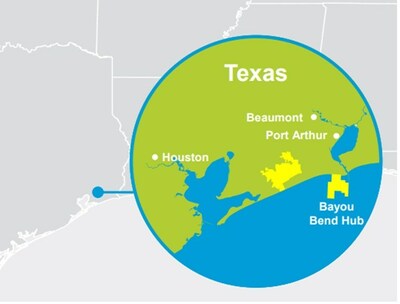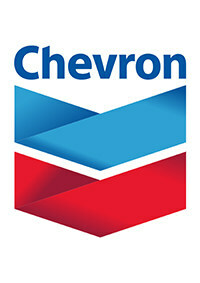HOUSTON, March 6, 2023 /PRNewswire/ — Bayou Bend CCS LLC (“Bayou Bend”), a carbon capture and sequestration project located along the Texas Gulf Coast, announced today an expansion of its carbon dioxide (“CO2”) storage footprint through the acquisition of nearly 100,000 acres onshore in Chambers and Jefferson Counties, Texas.The increased acreage positions Bayou Bend to be one of the largest carbon storage projects in the United States.

Combined with the previously announced approximately 40,000 acres offshore Beaumont and Port Arthur, Texas, the expanded Bayou Bend project now encompasses nearly 140,000 acres of pore space for permanent CO2 sequestration. The total acreage holds a gross storage capacity of more than one billion metric tons, positioning Bayou Bend to be a leading carbon transportation and storage solution for industrial emitters located in the Houston Ship Channel and Beaumont / Port Arthur region, one of the largest industrial corridors in the country.
Bayou Bend is a joint venture between Chevron U.S.A. Inc. (“Chevron”), through its Chevron New Energies division, Talos Energy Inc. (NYSE: TALO) (“Talos”), through its Talos Low Carbon Solutions division, and Carbonvert, Inc. (“Carbonvert”). Equity interests in Bayou Bend remain 50 percent Chevron, 25 percent Talos and 25 percent Carbonvert. Effective March 1, 2023, Chevron became the operator of the LLC.
Robin Fielder, Executive Vice President – Low Carbon Strategy and Chief Sustainability Officer of Talos, said: “We are excited about Bayou Bend and building the best regional carbon sequestration hub with the right storage infrastructure adjacent to two major Southeast Texas industrial corridors. Our partnership is committed to developing safe, reliable, cost-effective decarbonization solutions while enabling continued economic growth in the region. Today’s announcement solidifies Bayou Bend’s position as Southeast Texas’s leading carbon sequestration project.”
Chris Powers, Vice President, CCUS, Chevron New Energies, said: “Delivering CCUS and other lower carbon solutions to harder-to-abate industries is fundamental to Chevron New Energies’ mission. As a Southeast Texas native, I know how vital these industries are to our local communities and their economies. With this expansion, Bayou Bend is positioned to offer CCUS solutions across a broad region of the Gulf Coast, from Houston to Orange and into western Louisiana.”
Alex Tiller, President and CEO of Carbonvert, said: “Expanding Bayou Bend, alongside our partners Chevron and Talos, is Carbonvert’s next step to enabling critical large-scale carbon removal and reduction projects. This expansion sets us up well to achieve Carbonvert’s goal of sequestering 100 million tonnes before 2032 and underscores our position as one of the leading independent, pure-play carbon capture and storage developers in the world. We are grateful for the opportunity to serve such an important community in Southeast Texas and the greater Gulf Coast economy.”
Jefferson County Judge Jeff Branick said: “We are pleased that Chevron, Talos, and Carbonvert are progressing – and expanding – Bayou Bend in Jefferson County and the greater Golden Triangle area. This project has the potential to further enhance the economic strength of our community, and we look forward to working with the venture in their endeavor.”
Chambers County Judge Jimmy Sylvia said: “The expansion of Bayou Bend into Chambers County presents the region with a significant opportunity to ensure the continued economic vitality of the eastern Houston Ship Channel, Mont Belvieu area and eastern Chambers County for years to come. We look forward to our partnership with the developers.”
Winnie Area Chamber of Commerce Executive Director Debbie Breaux said: “Southeast Texas is home to some of the state’s most vital industries and we are excited about the opportunity to work with Chevron, Talos, and Carbonvert. Projects like Bayou Bend are directly linked to our mission of providing a desirable quality of life and economic environment, and we look forward to continued collaboration.”
In 2021, Talos and Carbonvert were selected as the winning bidders for the Texas General Land Office’s Jefferson County, Texas, carbon storage lease, located in state waters offshore Beaumont and Port Arthur, Texas. It remains the first and only offshore lease in the U.S. dedicated to CO2 sequestration. Chevron joined the Bayou Bend joint venture in May 2022.
Contacts:
Talos
Sergio Maiworm
investor@talosenergy.com
Chevron
Kelly Russell
KellyRussell@chevron.com
Carbonvert
Amanda Biggs
amanda@carbonvert.com
About Talos Energy
Talos Energy (NYSE: TALO) is a technically driven independent exploration and production company focused on safely and efficiently maximizing long-term value through its operations, currently in the United States and offshore Mexico, both upstream through oil and gas exploration and production and downstream through the development of future carbon capture and storage opportunities. As one of the Gulf of Mexico’s largest public independent producers, we leverage decades of technical and offshore operational expertise towards the acquisition, exploration and development of assets in key geological trends that are present in many offshore basins around the world. With a focus on environmental stewardship, we are also utilizing our expertise to explore opportunities to reduce industrial emissions through our carbon capture and storage initiatives along the U.S. Gulf Coast and Gulf of Mexico. For more information, visit www.talosenergy.com.
About Chevron
Chevron (NYSE: CVX) is one of the world’s leading integrated energy companies. We believe affordable, reliable, and ever-cleaner energy is essential to achieving a more prosperous and sustainable world. Chevron produces crude oil and natural gas; manufactures transportation fuels, lubricants, petrochemicals and additives; and develops technologies that enhance our business and the industry. We are focused on lowering the carbon intensity in our operations and growing lower carbon businesses along with our traditional business lines. For more information, please visit www.chevron.com.
About Carbonvert
Carbonvert Inc. is a carbon capture and storage project development and finance company that simplifies decarbonization for industrial clients. Carbonvert was established in late 2020 by Alex Tiller and Jan Sherman, veterans of the renewable and conventional energy sectors to manage the financial and technical complexities of CCS project development. Our executives have decades of experience developing projects, financing tax advantaged projects, trading carbon offsets, and structuring over $4 billion in infrastructure investments, including equity, tax equity, and debt for large assets. Carbonvert’s senior team has extensive experience with large-scale CO2 projects and have designed, secured environmental and CO2 storage permits, and completed and operated large-scale carbon capture, transportation, and storage projects notably Petra Nova CCS in Thompsons, Texas, Quest CCS in Alberta, Canada, and In Salah in Algeria. For more information, visit www.carbonvert.com.
THE PURPOSE OF “SAFE HARBOR” PROVISIONS OF THE PRIVATE SECURITIES LITIGATION REFORM ACT OF 1995
This news release contains forward-looking statements relating to Chevron’s operations and energy transition plans that are based on management’s current expectations, estimates and projections about the petroleum, chemicals and other energy-related industries. Words or phrases such as “anticipates,” “expects,” “intends,” “plans,” “targets,” “advances,” “commits,” “drives,” “aims,” “forecasts,” “projects,” “believes,” “approaches,” “seeks,” “schedules,” “estimates,” “positions,” “pursues,” “may,” “can,” “could,” “should,” “will,” “budgets,” “outlook,” “trends,” “guidance,” “focus,” “on track,” “goals,” “objectives,” “strategies,” “opportunities,” “poised,” “potential,” “ambitions,” “aspires” and similar expressions are intended to identify such forward-looking statements. These statements are not guarantees of future performance and are subject to certain risks, uncertainties and other factors, many of which are beyond the company’s control and are difficult to predict. Therefore, actual outcomes and results may differ materially from what is expressed or forecasted in such forward-looking statements. The reader should not place undue reliance on these forward-looking statements, which speak only as of the date of this news release. Unless legally required, Chevron undertakes no obligation to update publicly any forward-looking statements, whether as a result of new information, future events or otherwise.
Among the important factors that could cause actual results to differ materially from those in the forward-looking statements are: changing crude oil and natural gas prices and demand for the company’s products, and production curtailments due to market conditions; crude oil production quotas or other actions that might be imposed by the Organization of Petroleum Exporting Countries and other producing countries; technological advancements; changes to government policies in the countries in which the company operates; public health crises, such as pandemics (including coronavirus (COVID-19)) and epidemics, and any related government policies and actions; disruptions in the company’s global supply chain, including supply chain constraints and escalation of the cost of goods and services; changing economic, regulatory and political environments in the various countries in which the company operates; general domestic and international economic and political conditions, including the military conflict between Russia and Ukraine and the global response to such conflict; changing refining, marketing and chemicals margins; actions of competitors or regulators; timing of exploration expenses; timing of crude oil liftings; the competitiveness of alternate-energy sources or product substitutes; development of large carbon capture and offset markets; the results of operations and financial condition of the company’s suppliers, vendors, partners and equity affiliates, particularly during the COVID-19 pandemic; the inability or failure of the company’s joint-venture partners to fund their share of operations and development activities; the potential failure to achieve expected net production from existing and future crude oil and natural gas development projects; potential delays in the development, construction or start-up of planned projects; the potential disruption or interruption of the company’s operations due to war, accidents, political events, civil unrest, severe weather, cyber threats, terrorist acts, or other natural or human causes beyond the company’s control; the potential liability for remedial actions or assessments under existing or future environmental regulations and litigation; significant operational, investment or product changes undertaken or required by existing or future environmental statutes and regulations, including international agreements and national or regional legislation and regulatory measures to limit or reduce greenhouse gas emissions; the potential liability resulting from pending or future litigation; the company’s future acquisitions or dispositions of assets or shares or the delay or failure of such transactions to close based on required closing conditions; the potential for gains and losses from asset dispositions or impairments; government mandated sales, divestitures, recapitalizations, taxes and tax audits, tariffs, sanctions, changes in fiscal terms or restrictions on scope of company operations; foreign currency movements compared with the U.S. dollar; material reductions in corporate liquidity and access to debt markets; the receipt of required Board authorizations to implement capital allocation strategies, including future stock repurchase programs and dividend payments; the effects of changed accounting rules under generally accepted accounting principles promulgated by rule-setting bodies; the company’s ability to identify and mitigate the risks and hazards inherent in operating in the global energy industry; and the factors set forth under the heading “Risk Factors” on pages 20 through 25 of the company’s 2021 Annual Report on Form 10-K and in subsequent filings with the U.S. Securities and Exchange Commission. Other unpredictable or unknown factors not discussed in this news release could also have material adverse effects on forward-looking statements.
![]() View original content to download multimedia:https://www.prnewswire.com/news-releases/bayou-bend-expands-carbon-capture-project-to-onshore-southeast-texas-301763377.html
View original content to download multimedia:https://www.prnewswire.com/news-releases/bayou-bend-expands-carbon-capture-project-to-onshore-southeast-texas-301763377.html
SOURCE Talos Energy






